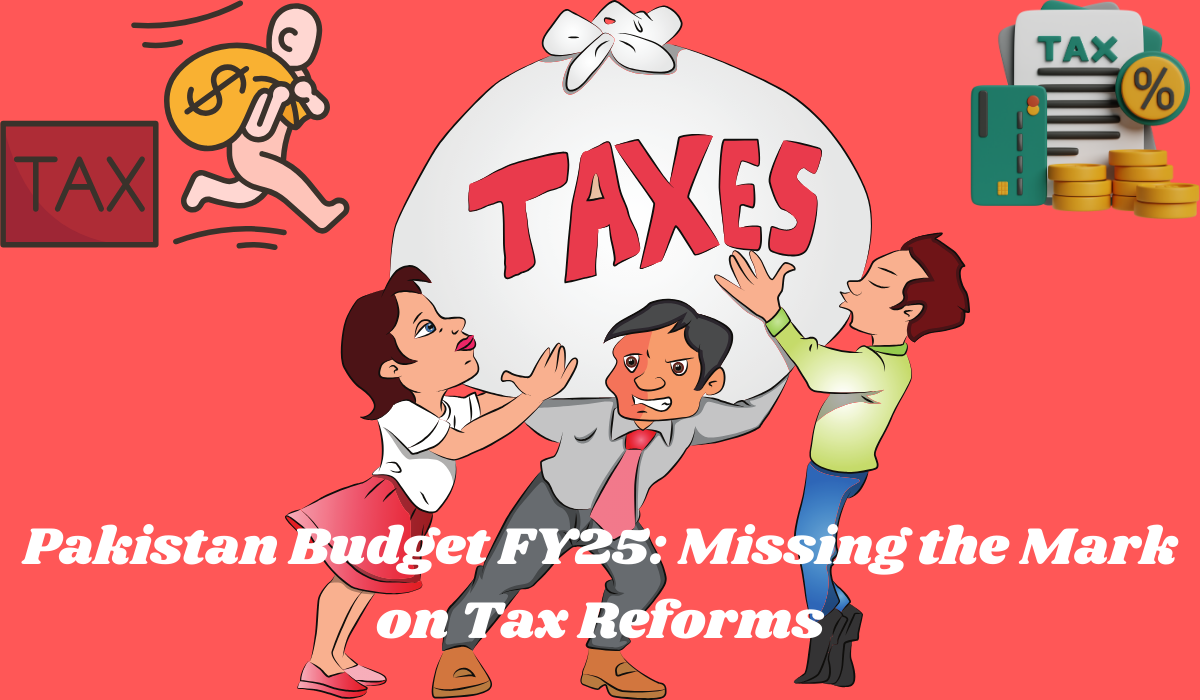Pakistan Budget FY25: Missing the Mark on Tax Reforms

Introduction
The Finance Bill for 2024-25 was recently announced in Pakistan. Unfortunately, it follows a familiar pattern of failing to expand the tax base and fairly include all economic sectors. Despite the government’s promises, the proposed measures fall short of addressing fundamental tax issues.
Key Problems in the Proposed Budget
1. Limited Efforts to Tax the Undocumented Economy
- No significant steps to incorporate the informal economy into the tax net.
- The focus remains on increasing tax rates for current taxpayers instead of broadening the base.
2. Increased Burden on the Salaried Class
- New tax measures target middle-income salaried individuals.
- Mid-management and technical professionals are particularly affected.
- Increased taxes add to the financial strain from inflation and reduced take-home pay.
3. Risk of Talent Drain
- Higher taxes for the middle class may lead to an increased brain drain.
- Over the past five years, over 100,000 skilled individuals have left Pakistan, a number that doubled in 2022 and continues to rise in 2023 and 2024 (Bureau of Emigration & Overseas Employment).
4. Disproportionate Tax Contributions
- Salaried taxpayers contribute more than their fair share, paying over Rs375 billion annually.
- In comparison, 3.6 million retailers contribute only Rs4-5 billion per year.
Inequities in Taxation
1. Under-Taxed Sectors
- Certain thriving sectors, like wholesale and retail trade, real estate, and service providers, often exploit legal loopholes.
- The agricultural sector contributes 20% of GDP but less than 1% of total income tax.
- Real estate and wholesale/retail sectors also remain largely untaxed despite their potential.
2. Withholding Taxes
- Major contributors include contractors, bank depositors, importers, and salaried sectors.
- However, agricultural income and other thriving sectors are inadequately taxed.
Goals and Shortcomings of the Proposed Bill
1. Ambitious Targets
- The government set a revenue target of Rs12.9 trillion and a GDP growth target of 3.6%.
- However, the measures to bring retail and wholesale trade into the tax net are insufficient.
2. Failure to Tax Agricultural Income
- The federal government often passes responsibility to provincial authorities regarding agricultural income.
- According to constitutional provisions, the Federal Board of Revenue (FBR) can tax unexplained agricultural income, yet this remains unaddressed.
Challenges in the Current Tax System
1. High Tax Rates and Complex System
- Businesses face over 50% tax rates on profits, alongside a complex withholding tax regime.
- This deters investment and stifles enthusiasm for economic participation.
2. Lack of Incentives for Local Manufacturing
- No significant incentives exist for local manufacturing, import substitution, or export growth.
- Some new measures make business transactions costly for non-filers but fail to expand the tax base significantly.
3. Burden on Compliant Businesses
- The parallel economy often evades taxes, leading to a disproportionate burden on compliant businesses.
- The Overseas Investors Chamber of Commerce and Industry (OICCI) warns that this imbalance could harm exports and foreign exchange reserves.
Recommendations for Fair Taxation
1. Revisit Tax Policies
- Remove the super tax on corporations and reduce income tax rates gradually to match regional averages.
- Simplify the withholding tax process.
2. Foster a Friendly Environment for Investors
- Recognize foreign investors’ contributions and address hurdles like profit limitations and business complexities.
- Ensure a balanced and investor-friendly tax regime to foster mutual prosperity.
3. Utilize Available Data
- Leverage data from the National Database and Registration Authority, the FBR’s Maloomaat Portal, and other sources for better tax base expansion.
- Implement data mining without adding more burdens on compliant taxpayers.
4. Embrace Digitalization
- Follow global trends towards a cashless economy, including measures like demonetizing high-value notes.
- Encourage fintech companies and merchants through tax incentives, promoting innovation and financial inclusion.
Conclusion
Expanding the tax base and increasing the tax-to-GDP ratio to at least 15-20% requires a comprehensive approach. This includes firm commitments, capacity-building initiatives, and better resource allocation for tax collection. A fair and inclusive tax system can boost business confidence, stimulate investment, and promote sustainable economic growth.
Sources:
- Bureau of Emigration & Overseas Employment
- Overseas Investors Chamber of Commerce and Industry (OICCI)
- Federal Board of Revenue (FBR)



4 thoughts on “Pakistan Budget FY25: Missing the Mark on Tax Reforms”